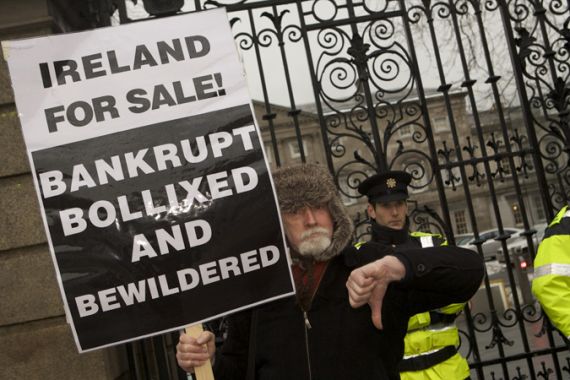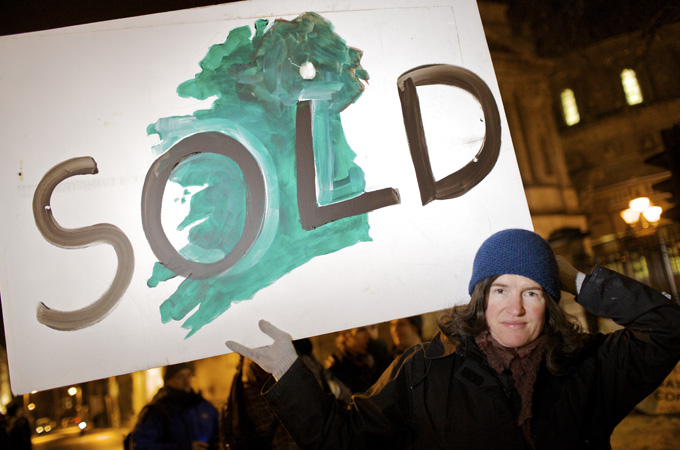Irish budget wins first vote
Parliament narrowly approves tax hikes as part of Ireland’s most brutal budget in history.

 |
| Irish officials say a failure to secure the EU-IMF bailout would have raised “serious doubts” about Ireland’s ability to pay its bills from mid-2011 onward [EPA] |
The Irish government has won the first parliament vote on its 2011 austerity budget, which comprised 6bn euros (8.0 billion dollars) in savings via tax hikes and spending cuts that are necessary to secure an EU-IMF bailout.
Tuesday’s vote, which is the first of a series on taxation measures, was passed by 82 votes to 77 in the Dail (parliament).
Keep reading
list of 4 itemsWhy are nations racing to buy weapons?
Parallel economy: How Russia is defying the West’s boycott
US House approves aid package worth billions for Ukraine, Israel
It was just one of many votes needed to pass the budget, and the process is not expected to be wrapped up until early next year.
Minister for Finance Brian Lenihan earlier unveiled the budget to the parliament, claiming the austerity efforts were a necessary response to the “worst crisis in Irish history.”
“As outlined in the plan, six billion euros of the overall adjustment is made in today’s budget.
The scale of this adjustment is demanding but it demonstrates the seriousness of our intent,” Lenihan told MPs.
The budget will cut 925 millions euros from social spending and 765 million will come out of the already-stretched health service.
Announcing a cut in child benefits by 10 euros a month among other measures, Lenihan said “in dramatically changed circumstances, the state could no longer afford the social spending of the boom years.”
Lenihan predicted that the Irish economy was set for modest growth this year of 0.3 per cent after a deep recession.
“If the real economy is poised to grow, why do we need the help of the IMF and the EU?.
“The answer is: we need their support to break the vicious cycle that has threatened our national finances and our banking system since the second quarter of this year,” said Lenihan.
The 2011 budget contains two billion euros of tax increases and four billion euros of expenditure cuts. The government unveiled measures such as cuts to ministers’ salaries and increases to taxes on income and fuel.
Public anger
Ireland’s governing Fianna Fail/Green party coalition, led by Brian Cowen, the prime minister, is clinging to power amid public anger over the eurozone nations’ debt crisis.
“This has been a traumatic and worrying time for the citizens of our country.
“They are concerned that we have to seek external support to help us with our economic and financial difficulties. They are worried about the impact of this momentous and difficult decision on their lives,” Lenihan said.
The nation’s cash-strapped coalition government only recently applied for the enormous bailout loan from the European Union and the IMF.
Lenihan said Ireland urgently needed the EU-IMF cash to break out of a “vicious cycle” whereby international investors were rapidly losing confidence in the government’s ability to control the public finances.
The Irish government wants to slash the country’s public deficit from about 32 per cent of GDP this year, to below the EU target threshold of 3.0 per cent by 2015.
Lenihan said the cuts announced on Tuesday would reduce the deficit to 9.4 per cent of GDP in 2011.